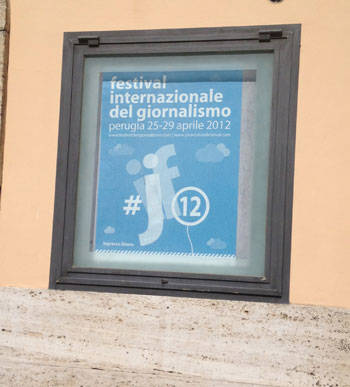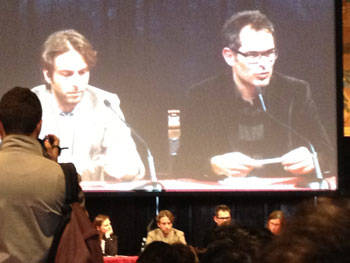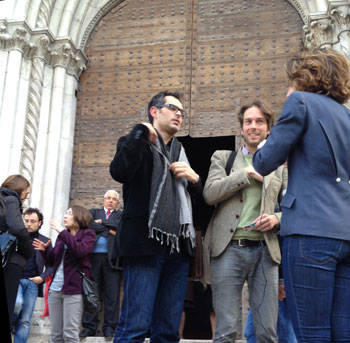Perugia: Chronicles from the International Journalism Festival
If Italy is the land of contradictions, of golden Tuscan sunsets and Neapolitan mountains of refuse, then Perugia must be, in one way, a microcosm. Because of its huge student population (some 30,000 of about 160,000 inhabitants), the ancient Umbrian capital is youthfully exuberant. And its hip, friendly atmosphere coexists with a party culture that sometimes gets out of control, most notoriously in the alleged events leading up to the 2008 murder of the young English student Meredith Kercher.
This week, however, Perugia is doing something it does best, hosting a festival. In what might be the ultimate in inside baseball (or inside calcio), it’s year 12 of the International Journalism Festival. But true to the egalitarian ethos of the place, all events are free, and they’re in various venues all over town. In that way, it’s much like summer’s Umbria Jazz Festival, which has some paid headline acts, but also features a New Orleans marching band parading at regular intervals, and free concerts around town.
The big act that kicked off the festival, which began on Wednesday, April 25, Italy’s Liberation Day, was the movie “Italy, Love It or Leave It,” by documentary film makers Luca Ragazzi and Gustav Hofer. The directors play themselves, and drive around Italy in an old Fiat 500 looking for reasons to stay in il bel paese, rather than emigrate, as did many of their friends.
It’s a poignant movie, and highlights all the emotional tugs that push young Italians away, or keep them close to home, sometimes in spite of themselves. We see loud old ladies defending the departed Silvio Berlusconi (“He’s a young man! He has a young man’s heart!”). The film makers explore the harsh reality of the system that feeds Italy so wonderfully, where migrant farm workers struggle under terrible conditions and collapse in filthy dormitories. And so on…
But then, there are moments of extreme beauty. The orderly Tuscan landscape, the Sicilian coast (though in their unsentimental way, Hofer and Ragazzi also explore “Sicilia Incompiuta,” vast public works follies that were never completed). And the pair find hope in a political figure like Nichi Vendola, a gay man who managed to get elected governor of Puglia.
The film was reason enough to be in Perugia’s ornate Sala dei Notari, in its city hall on the main drag, the pedestrian Corso Vannucci. The discussion that followed was an added bonus. Spoiler alert: The film makers stayed, and gave their reasons for doing so.
Hofer told the audience that with Berlusconi gone, the country’s at an important juncture, and true change might actually be possible. “It’s time to stop complaining,” he told an admiring crowd of journalists, students and walk-ins. “”We’re the ruling class and it’s time to act like it.” [note—these are my translations from Italian]
The documentary makers added that Italians have a chance to get their self-respect back, now that the notoriety of the bunga-bunga parties given by the former prime minister fade into memory.
Caterina Soffici, a blogger for the left-wing Il Fatto Quotidiano, provided a counterpoint. She departed for London for, among other things, to ensure a better future for her children. She pointed to the recent press scandal in England, where Rupert Murdoch was forced to close The News of the World, over reported wiretapping by reporters and editors there. “In England they’re forced to quit and shut down,” she said, “but here, when caught in a scandal, they vow and vow to stay.”
Soffici admitted that being away from home is a “tormentone,” literally, a great torment. But, she told the crowd, while life in Italy is generally more pleasant than in the Anglo-Saxon countries, “la dolce vita can be a cage.”
Hofer brought the event to a close (despite a verbose question that followed and that no one answered, as the crowd headed for the door) by saying, “It’s good when people leave here, get some good experience, and come back with what they’ve learned. It’s bad when leaving isn’t a choice.”








































i-Italy
Facebook
Google+
This work may not be reproduced, in whole or in part, without prior written permission.
Questo lavoro non può essere riprodotto, in tutto o in parte, senza permesso scritto.